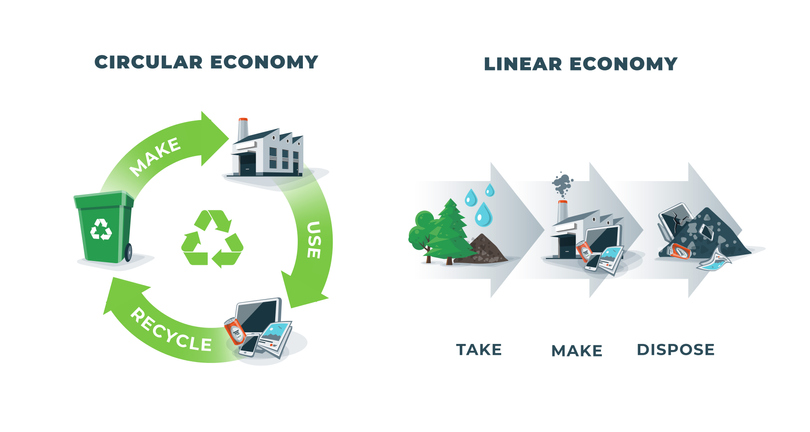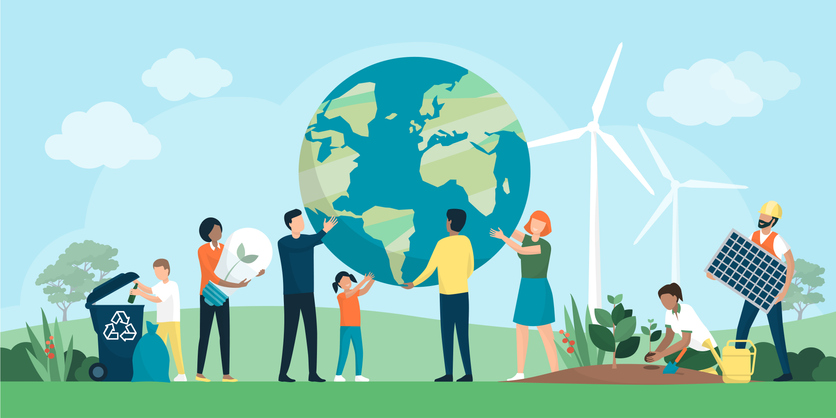Almost everyone is nowadays familiar with the notion of recycling. However, not everybody is acquainted with the idea of Circular Economy (CE). While recycling has to do with the recovery and reprocessing of waste materials such as glass, paper, plastic and aluminum for use in new products, Circular Economy is rather a system, where materials and products are designed in the first place in a way that makes them suitable for easy repair and reuse. Instead of a linear and wasteful economy, the model of sustainable circular economy foresees the repair, remanufacture and reuse of a wide range of materials from electrical and electronic equipment and furniture to vehicles and building components. In this way, the environment is protected, as fewer raw materials are ultimately required. At the same time Circular Economy generates economic value influencing a variety of economic sectors such as tourism, transport, agriculture etc. with the ultimate goal to reduce as far as possible their environmental footprint.
Greece has already developed a National Plan for Energy and Climate (NPEC) in accordance with the 17 global Sustainable Development Goals of the UN Agenda 2030 as well as with the European Green Deal aiming at developing a greener economic model through decarbonization, renewable energy sources and tackling climate change. Setting, in some cases, even higher goals at national level, the country is also developing a National Strategy for Circular Economy as a horizontal action aiming at the optimal use of resources (energy, water, raw material) in every economic sector.

In a virtual event recently organized by the Hellenic Association for Energy Economics (HAEE), George Kremlis, principal advisor to the Greek PM on energy, climate and circular economy, confirmed that CE is a priority for Greece underlining the growth potential and the creation of many green jobs with the gradual CE’s implementation to the Greek economy. According to Kremlis, the new Strategy for CE, covering a wide range of economic activities, involves new production but also consumption models that would extend products’ life cycle. He also emphasized on the local government’s role concerning the contribution of cities and regions to the reduction of carbon emissions from transport and health sectors to school restoration and energy efficient public buildings.
When it comes to the financing of these projects, there is a variety of available funding programmes in European, national and local level. From the National Strategic Reference Framework (NSRF) and the European Green Deal’s Investment Plan to the recent national Antonis Tritsis programme for the financing of local governments, there is a variety of financial tools for energy transition, water supply, networks and buildings as well as for smart applications development. At the same time, a series of financing incentives is foreseen for companies investing in circular economy and industrial symbioses, in water reuse after biological treatment etc, while green innovation will also be supported. The ultimate goal is the implementation of projects that will bring added value in all sectors of the Greek economy, with the participation of the private sector.

Public and private partnerships will play an important role in CE and in sectors such as renewable energy sources and waste management. E-mobility is also a sector that requires significant private sector’s contribution. A mixture of economic incentives and actions will be needed in order to achieve transition to a low-carbon emissions era through affordable electric vehicles, without neglecting the importance of clean energy in charging stations. The NPEC envisages total investments of 43.8 billion euros in renewable sources, natural gas, distribution networks, electricity transport as well as financial incentives for the purchase of electric cars and energy saving by 2030.
Read more on Greek News Agenda: Greece’s Green Agenda on Energy and Climate
I.E.
TAGS: ECONOMY & DEVELOPMENT | ENERGY | ENVIRONMENT














